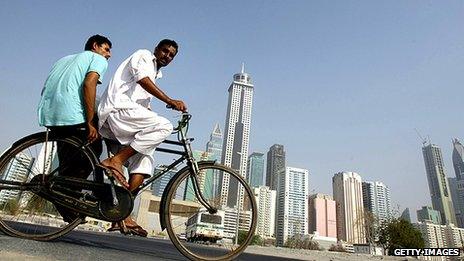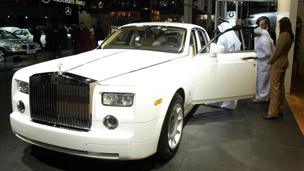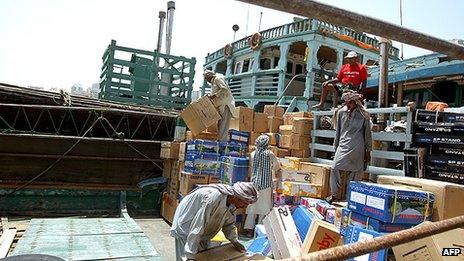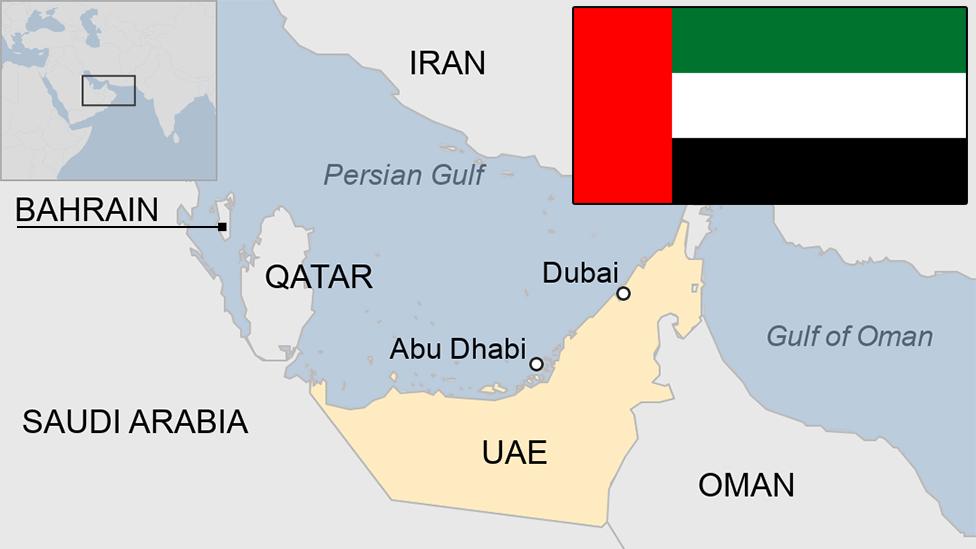The Somali millionaire 'thanked' for being rich
- Published

The emirate of Dubai is one of the richest places in the world with a large population of foreign nationals - including tens of thousands of expat Somalis, some wealthier and more successful than others.
"Why this car?" I asked.
"Because I don't like the Phantom."
"The Phantom?"
"Oh, you know, the Rolls-Royce Phantom."
The car I was talking about was a Bentley. And the man I was talking to was a Somali, originally from Mogadishu, who had done rather well for himself in the mobile phone business.
He was dressed in an understated but expensive way. We were in the underground car park of a giant, glitzy shopping mall in Dubai.

Dubai is a mix of the ultra-wealthy and those who still dream
The car was enormous. Six metres (20ft) long and a rich, dark gold colour. A small Indian man was polishing its wheels.
"Get in," said the Somali.
I obeyed his instruction and placed myself as elegantly as I could on the smooth leather seat. The floors were made of soft brown fur.
"Lambskin," Abdullahi Abdi Hussein said, as he closed the door for me. A quiet, expensive clunk.
"This car cost $500,000 (£315,000)," he added as he slid into the driver's seat.
"Look at the dashboard. It's African cherry wood and crystal. The interior, including the ceiling, is cow leather. Special cow, blemish-free cow, bred especially for Bentley."
We purred into action and out into the sunlight. The glistening, glass-and-marble world of Dubai. Past the tallest building in the world. A city where everything looks unreal - even the people.
"I like the best of everything," said Abdullahi. "Have you heard of Number One perfume? "
"I've heard of Chanel No 5."
"No, I'm speaking about Number One - the most expensive perfume in the world."
"Here," he said, giving me his phone. "This is a photo I took of my bottle. Next to my watch."
He told me the make of the watch which I now forget but I have checked the price of the perfume he was talking about.
It is £2,700 ($4,300) for 30 millilitres.
Before I tell you more about my journey in the Bentley, I think I should tell you about the other Somalis I met in Dubai.
They were right in the middle of the city, in a place that contrasts dramatically with the extreme order, the perfect cars and clothes, the extraordinary buildings in all sorts of surreal shapes and sizes. A world apart from the air-conditioned shopping malls selling things that none of us really needs, at prices I certainly cannot afford.
Moored in the creek that runs through Dubai is a long stretch of old, scruffy, splintering wooden dhows. Their design has not changed much for centuries. The sailors are Gujaratis and several of those I met did not even have shoes.
All of them were going to Somalia, including Mogadishu, which is often described as the most dangerous city in the world. They did not seem in the least bit concerned.
The area was a frenzy of activity.
All sorts of things were being loaded on to the dhows, Somali merchants keeping a sharp eye on what went where.
There was a lot of dried pasta, a staple in Somalia. There was quite a lot of bottled water. There were cars, vans and spare tyres, scaffolding, paint, tiles - an amazing array of construction material, a sign perhaps that Somalia is starting to rebuild itself after more than 20 years of war.
Even though it is a country of fewer than 10 million people and has come top of the world's list of failed states for the past four years in a row, it is, I am told, the second biggest importer of goods from Dubai, after Iran.
And it does this in the most basic of ways, by loading goods on to wooden boats which then take a few days to sail to Somalia. Some of them are seized by pirates on the way.

Dubai creek is a key trading post for shipments to Somalia
But back to that car, that Bentley with its digital displays, wireless headphones and no fewer than 20 speakers to pump out the music.
It even had massage machines built into the seats which, I confess, I found truly delicious.
As we slid along boulevards - the playgrounds of the rich - people stopped and stared, their heads swivelling in amazement, eyes popping, sometimes cameras flashing.
"What do other Somalis make of you and this car?" I asked.
"Oh, they are extremely happy. They congratulate me and say thank you. They say seeing me in my car makes them proud to be Somali."
"They don't feel jealous or disgusted?"
"Oh no. Why should they? I give them hope. I bought this car because it shows success."
As those flashing cameras showed, the Bentley even managed to impress the ultra-wealthy residents of Dubai.
But I am not sure what it would have meant, if anything, to those Somalis I met at the port, or indeed the Somalis back home in Mogadishu, most of whom can only dream of owning a car, let alone a Bentley.
How to listen to From Our Own Correspondent:
BBC Radio 4: A 30-minute programme on Saturdays, 11:30 BST.
Second 30-minute programme on Thursdays, 11:00 BST (some weeks only).
Listen online or download the podcast
BBC World Service:
Hear daily 10-minute editions Monday to Friday, repeated through the day, also available to listen online.
Read more or explore the archive, external at the programme website, external.
- Published7 September 2023
